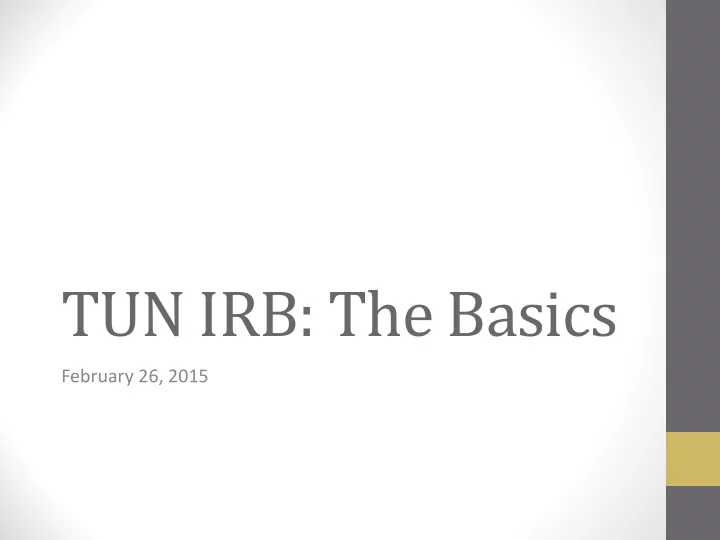

TUN IRB: The Basics February 26, 2015
IRB Function • Review human-subject research • Ensure the rights & welfare of human subjects are adequately protected
Why? • Historical events such as: • The Nazi Experiments • Tuskegee Syphilis Study
The Belmont Report - 1978 The principles of the Belmont Report govern all research supported by the US Government. The ethical principles outlined in the report are the basis for subsequent regulations designed to ensure protection of human subjects in research.
Belmont Report Basic Principles 1. Respect for Persons 2. Beneficence 3. Justice
Respect for Persons • Treat individuals as autonomous agents • Do not use people as a means to an end • Allow people to choose for themselves • Provide extra protections to those with diminished autonomy (i.e., prisoners, children, people with cognitive impairment, etc)
Beneficence • First, do no harm • Second, maximize possible benefits and minimize risks
Justice • Treat people fairly • Fair sharing of burdens and benefits of the research An injustice occurs when: • Benefits to which a person is entitled are denied without good reason, or • When burdens are imposed unduly.
Rules Derived from the Principles • Respect • Informed Consent Process • Respect for privacy • Beneficence • Good research design • Competent investigators/researchers • Favorable risk-benefit analysis • Justice • Equitable selection of subjects
The Common Rule The “Common Rule” is the set of regulations which were developed to ensure compliance with the principles of the Belmont Report.
Protective Mechanisms established by The Common Rule • Institutional assurances of compliance • Review of research by an IRB • Informed consent of subjects
Institutional Assurance TUN has negotiated with the Office for Human Research Protections (OHRP) that all of the institution’s human subject research activities, regardless of funding, will be guided by the Belmont Report, will comply with the Common Rule, and other regulations as applicable. AKA: Federalwide Assurance (FWA)
IRB Review of Research All research projects are categorized in to one of three categories for the IRB review process. • Full • Expedited • Exempt
Full Review • Usually involves more than minimal risk to the human subject. • Always for protected populations (children, prisoners, etc.) • All IRB members review the application and materials. • Must meet and have quorum (majority) present to discuss and vote.
Expedited Review • Usually minimal risk to the human subject • Never for protected populations • IRB Chair may approve after review • May also assign one or more IRB members to review • Does not require a vote • Expedited does not mean “fast”. It is a federal term used for research that must meet specific criteria (DHHS 45 CFR 46.110)
Exempt from IRB Review • Committee review is not required for certain categories of research activities that involve little or no risk to human subjects. • To determine if your research qualifies for exemption complete the “Exempt Determination Form”. • Only IRB can make the determination of Exempt, this cannot be determine by researchers.
Types of Review • Initial • Continuing Review • Amendments • Adverse Events or Deviations • Noncompliance
Criteria for IRB Approval • Risks are minimized • Risks are reasonable in relation to benefits • Selection of subjects is equitable • Informed consent will take place • Informed consent will be documented • Research plan includes monitoring the data to ensure safety of the subjects • Research plan protects the privacy of subjects & maintains confidentiality • When some or all of the subjects are likely to be vulnerable to coercion or undue influence, additional safeguards need to be included in the protocol to protect the rights and welfare of these subjects.
IRB has the authority to: • Approve • Require modification prior to approval • Table • Disapprove all research activities including proposed changes in previously approved human subject research.
Informed Consent • Information – includes research procedure, purpose, risks, benefits, alternatives, … • Comprehension – consider reading & comprehension capacity • Voluntariness – requires conditions free of coercion and undue influence.
Consent Form Required Elements • Statement the study involves research • Research is described • Description of risks • Description of benefits • Disclosure of alternatives • Confidentiality • If more than minimal risk, compensation and/or medical treatment • Participation is voluntary • Whom to contact
Additional Elements … • Unforeseeable risks • Early termination • Additional costs to subjects • Consequences of a subject’s decision to withdraw from study participation • Disclosing new findings which may impact a subject’s willingness to continue participation • Number of subjects involved
Informed Consent Process • More that just an IRB-approved document! • Consent begins at recruitment . (advertisements, flyers, survey announcement, etc. must be approved by IRB) • Initial consent – take the time to discuss • Ongoing consent – at every encounter remind subject of the consent process
TUN IRB Forms • Exempt Determination Form • Full/Expedited IRB Application • Continuing Review Form • Closeout Report Form • Adverse Event Form • Amendment Request Form
References: Bankert, E. A., & Amdur, R. J. (2006). Institutional review board: management and function. Sudbury, MA: Jones and Bartlett Publishers. Office for Human Research Protections (OHRP). (n.d.). Retrieved February 25, 2015, from http://www.hhs.gov/ohrp/index.html Touro University Nevada (2014). Institutional Review Board Manual.
Recommend
More recommend